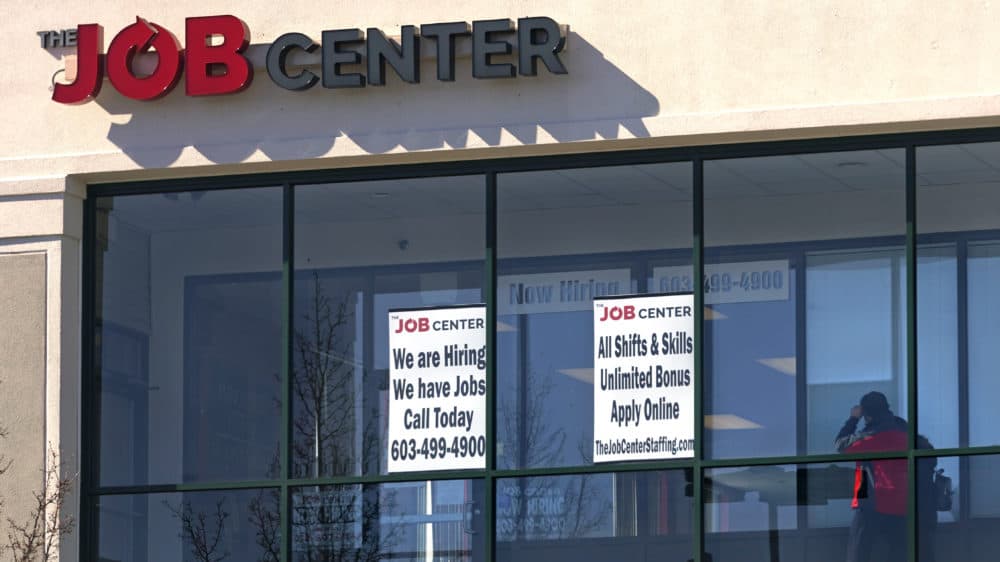Advertisement
Coronavirus Coverage
Jobless May Need Help Transitioning To Post-Pandemic Work

The state must invest in workforce development programs to help people transition into technical trades and other in-demand industries if they are unable to return to their old jobs eliminated during the pandemic, a new report from several statewide workforce organizations recommends.
The paper, presented Monday at a virtual policy briefing for legislators, recommended five steps to ensure "a full equitable and sustainable recovery," including expanded technical training, funding for programs for speakers of other languages, investments in digital access, and the ramping up existing workforce system capacities.
"With a new influx of federal stimulus dollars expected this spring, it is imperative that efforts be targeted to people who have been hurt the most during the pandemic; and ideally, to help them thrive beyond pre-COVID levels," the paper said.
The report was written by Kathie Mainzer of Workforce Solutions Group, Tonja Mettlach of Massachusetts Workforce Association, and Anne Calef of Boston Indicators.
Some unemployed workers will need to switch to new occupations, but may not have the necessary access to training required for positions, the report states. As a result, Massachusetts should scale up and fund effective job training in sectors with high employer demand, offer on-the-job paid training, and allocate funding for retaining instructors, the report recommends.
The paper says funding should head to existing organizations that identify talent needs and create joint training ventures like the Workforce Competitiveness Trust Fund and Learn to Earn, both offered by the Commonwealth Corporation.
"The Workforce Competitiveness Trust Fund is a major one. It's a competitive grant program around the state," Mainzer said. "You must have employers at the table that have vacant jobs, and the employers partner with a community college or [vocational technical] school or training organization to help people get their CDL driver's license or a CNA certification or early childhood education certification."
The pandemic's impact on the state's accommodations and food services sectors topped all other industry areas in job loss between February 2020 and January 2021, according to the report. Roughly 103,300 people lost employment during that time period in accommodations and food services, with health care and social assistance coming in second at about 49,900.
Advertisement
Forced shutdowns and capacity restrictions meant to curb the spread of the virus also brought on an economic downturn that silenced bustling downtown areas. The effect of staying at home, the report said, created a "slightly counterintuitive effect" of further job losses in the service sector.
"Many Massachusetts workers are now working remotely, which almost paradoxically, has led to even more service sector job loss in downtown areas as there's less workers to frequent those businesses, services," Calef said. "All of this has translated to the high unemployment rate ... which has been above the national rate for most of the pandemic."
With the shift to remote working, the need for stable internet connectivity and devices has skyrocketed. Access to online learning, the report said, is one of the largest equity gaps that keep some populations from "opportunity and prosperity."
"Every child and adult needs reliable, affordable internet and technology to participate in basic education, upskilling and career preparation/ongoing learning," the paper said.
SkillWorks Executive Director Andre Green said access to digital resources is one of the largest pre-existing inequities with roughly 16% of workers statewide in hard-hit industries lacking access to high-speed internet. That number, he said, rises to 26% in communities like Fall River and Springfield.
"This is important because we know that to get access to high quality jobs in this environment you need digital access, in order to apply for jobs you need digital access," he said. "In order to train for jobs, you need digital access. So this means that the workers who most needed it are going to be increasingly locked out of the possibility of applying for and working in good jobs."
Sectors that traditionally buoy the Massachusetts economy through financial downturns — health care and education — have also experienced difficulties of their own.
Taken together, the report notes the state had an unemployment rate below the national rate every month from July 2007 to March 2020 but jumped above the national average in April 2020 "and continues to exceed that national benchmark."
The effects of job loss were not experienced equally across economic, racial, and gender lines, the report said, as lower-wage workers, women, workers of color, and young adults felt the effects disproportionately. Job loss "has been especially pronounced for women and even more so for women of color, because of the sectors they tend to work in, and because they are often the primary caregivers at home," the authors wrote.
"This translates to a large setback for women in the workforce” as of December 2020, there were roughly 2.1 million fewer women in the labor force than in February 2020," the report said. "Because of their heavy representation in hard-hit sectors and care constraints, women of color have been particularly impacted."
The paper suggests expanding funding for language learning opportunities for people who have limited English proficiency like JVS Boston's English for Advancement Program, which is said to have "engaged" more than 1,000 residents in Boston, Lynn, Lowell, and Lawrence. It also recommended making those programs available to furloughed or laid-off workers so that they can take advantage of the time "to increase their English proficiency and develop other vocational skills that will help them advance in career pathways."
JVS Boston Senior Vice President Amy Nishman said the pandemic specifically affected economic sectors that tend to employ large numbers of immigrants. She said these areas are expected to be slowest to return, leaving thousands who are without work, without jobs to return to.
"They will need new skills and an antecedent to skills training for second language speakers is ESOL classes, specifically programs that focus on teaching work readiness skills," she said.